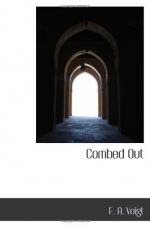The French did not sing, but we, who were escaping destruction, passed from one song to another:
“I don’t want
to fight the Germans,
I don’t want to go to
war,
I’d sooner be in London,
Dear old dirty London.”
And
“Far, far from Ypers,
I’d like to be,
Where German snipers
Can’t get at me.”
And
“When this bloody war
is over,
O how happy I shall be,
When I get my civvy clothes
on,
No more soldiering for me.”
and all the other songs familiar to every soldier in the British army.
We marched all day along straight roads running in between flat fields and past ugly little villages. As we grew tired and footsore our rollicking spirit abated and the singing died down.
Towards nightfall we halted in a large meadow with a pond in one corner. Several lorries loaded with tents were waiting for us. We unloaded them, pitched the tents, crept into them, and went to bed.
The rumble of the cannonade sounded faintly in the far distance.
“I reckon it’s a bloody shame to let the other Tommies and the Frenchies....”
The voice seemed to die away into a drawl as weariness overcame me. I continued to hear the sound of words for a little while, but they conveyed no meaning. And then sleep descended and brought entire oblivion.
VIII
HOME ON LEAVE
“I have several times expressed the thought that in our day the feeling of patriotism is an unnatural, irrational, and harmful feeling, and a cause of a great part of the ills from which mankind is suffering; and that, consequently, this feeling should not be cultivated, as is now being done, but should, on the contrary, be suppressed and eradicated by all means available to rational men.”
(TOLSTOY.)
A change had come over us all. Instead of long spells of dreary silence interrupted by outbursts of irritability, by grumbling and by violent quarrels over nothing, there was animated conversations and sometimes even gaiety. Our talk was all about one subject—not about peace, for we had abandoned all hope of peace and hardly ever thought of it—but about leave. We had been waiting for seventeen months when, without warning, a leave allotment was assigned to our unit. About half a dozen men were going every day and no one knew whose turn would come next. We were full of intense excitement and glad expectation, but also of anxiety in case something should happen to stop our leave altogether.




